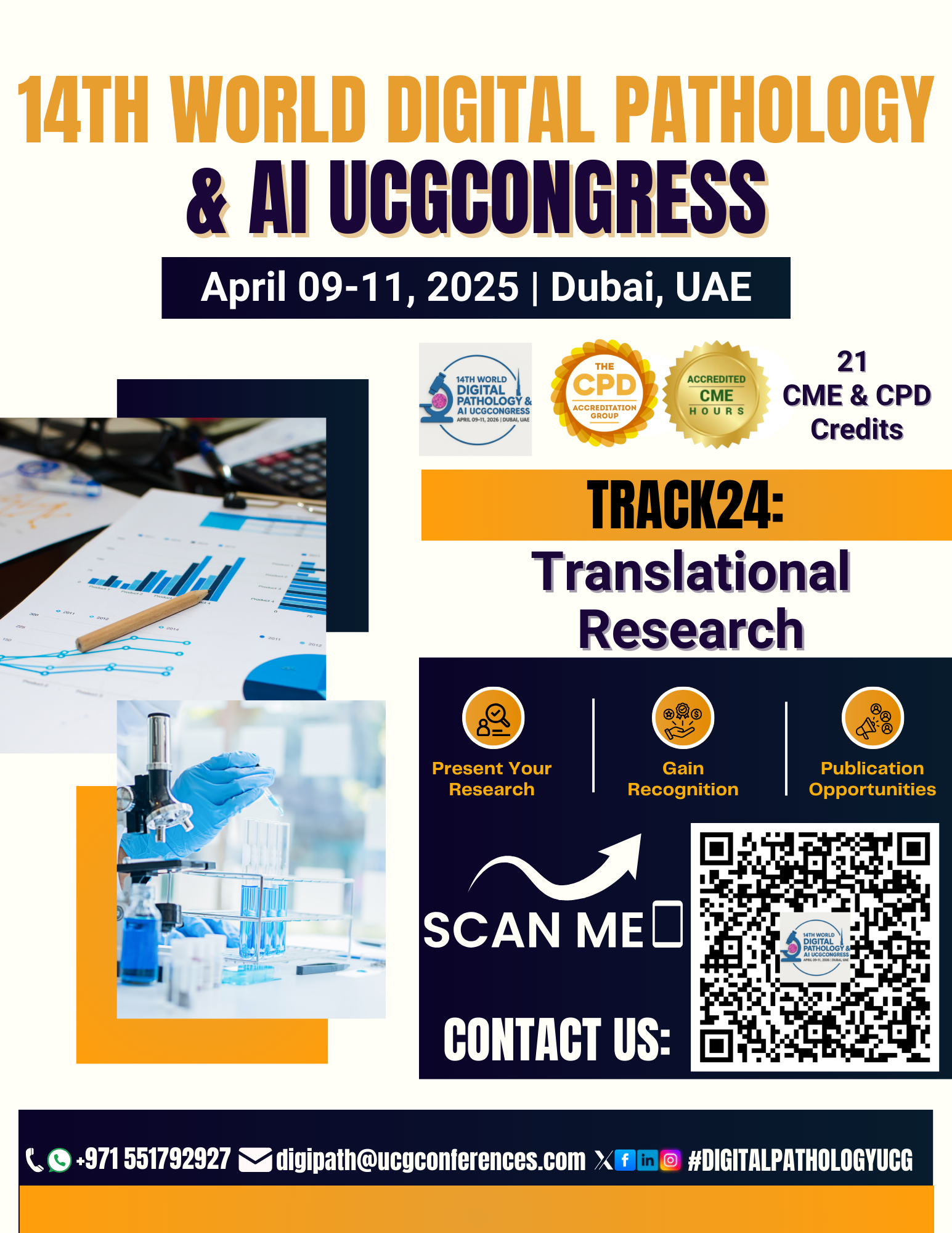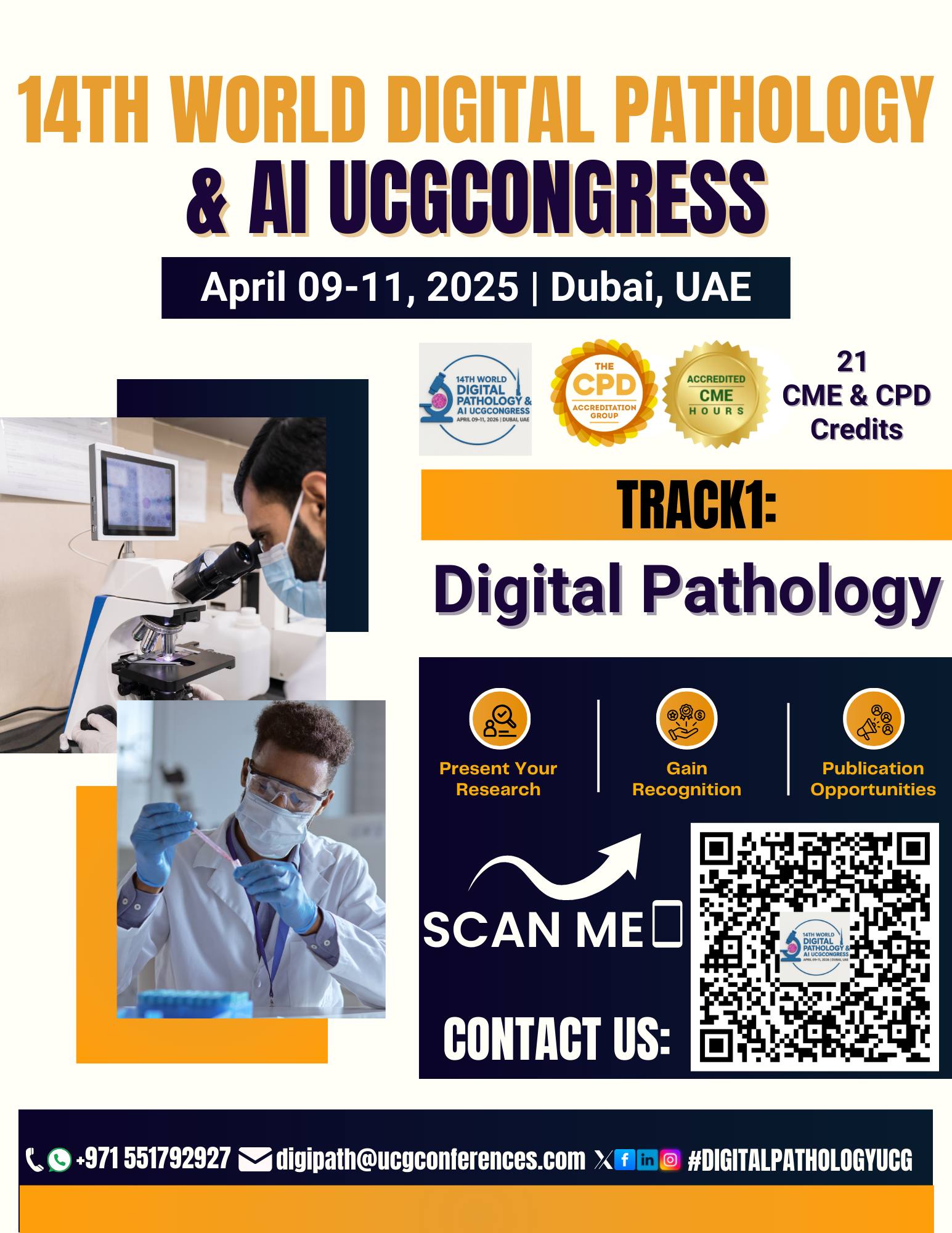



Sub track:-
Enhanced Image Quality Quantitative Analysis, Faster Turnaround Times,...

Sub track:-
Integration of Imaging Modalities, Advanced Image...

Track Overview:
Translational research bridges the gap between
basic science discoveries and clinical applications, enabling the development
of innovative diagnostic and therapeutic solutions. In the context of digital
pathology, translational research plays a critical role in applying
cutting-edge imaging technologies, AI tools, and molecular insights to improve
patient care and advance personalized medicine. This track will focus on how
digital pathology is accelerating translational research, particularly in oncology,
genomics, and other areas of precision medicine.
Key Topics:
Introduction to Translational Research in Pathology:
Understanding the concept of translational research and how it connects
laboratory discoveries with clinical practice, with a focus on pathology.
Digital Pathology and Personalized Medicine: How
digital pathology is aiding in the identification of biomarkers and disease
mechanisms that inform personalized treatment strategies.
AI and Machine Learning in Translational Research:
The role of AI in analyzing pathology images and integrating data from various
sources (genomic, clinical) to enhance research and clinical outcomes.
Pathology’s Role in Drug Development: The
importance of pathology in pharmaceutical research, particularly in identifying
new therapeutic targets, assessing drug efficacy, and monitoring treatment
responses in clinical trials.
Clinical Trials and Biomarker Discovery: How
digital pathology tools are supporting biomarker discovery and facilitating
patient stratification in clinical trials, leading to more effective
treatments.
Challenges and Opportunities in Translational
Pathology: Addressing the challenges faced by researchers and clinicians in
integrating digital pathology technologies into translational research, including
data integration, validation, and regulatory hurdles.
Future Directions in Translational Research:
Exploring the future of digital pathology in translational research, including
innovations in multi-omics, AI integration, and the development of new diagnostic
and therapeutic strategies.
Learning Objectives:
Understand the principles of translational research
and its relevance to digital pathology.
Learn how digital pathology technologies are
enabling the identification of biomarkers and the development of personalized
treatment approaches.
Explore how AI and machine learning are being used
to enhance research, particularly in the integration of pathology images with
genomic and clinical data.
Gain insights into the role of digital pathology in
drug development, from biomarker discovery to monitoring treatment efficacy.
Discuss the challenges in applying digital
pathology to translational research and the opportunities to overcome these
obstacles for improved patient outcomes.
Stay updated on the latest innovations and trends
in translational research, including the use of multi-omics and the integration
of digital pathology into research workflows.
Target Audience:
Pathologists, oncologists, and researchers involved
in translational research and clinical trials.
Scientists working in biomarker discovery, drug
development, and precision medicine.
Clinical researchers, including those working in
clinical trials and patient stratification.
AI and data science professionals developing tools
for translational research in pathology.
Healthcare administrators, policymakers, and
regulatory experts interested in the application of digital pathology in
translational research.
Speakers/Presenters:
Experts in translational research, including
pathologists and clinicians applying digital pathology in the context of
personalized medicine.
AI and machine learning specialists working on the
integration of pathology data with genomic, clinical, and other multi-omics
datasets.
Researchers focused on biomarker discovery and
clinical trial design using digital pathology tools.
Pharmaceutical professionals discussing the role of
pathology in drug development and treatment monitoring.
Regulatory experts addressing challenges in
validating and standardizing digital pathology tools in clinical and research
settings.
Conclusion:
This track will provide a deep dive into how digital pathology is driving advances in translational research, enabling better diagnostic, therapeutic, and drug development strategies. Attendees will gain valuable insights into the intersection of digital pathology, AI, and personalized medicine, as well as the challenges and opportunities for applying these technologies in translational research and clinical practice.